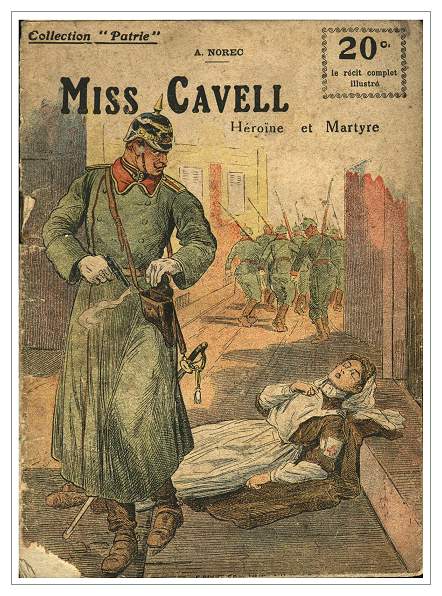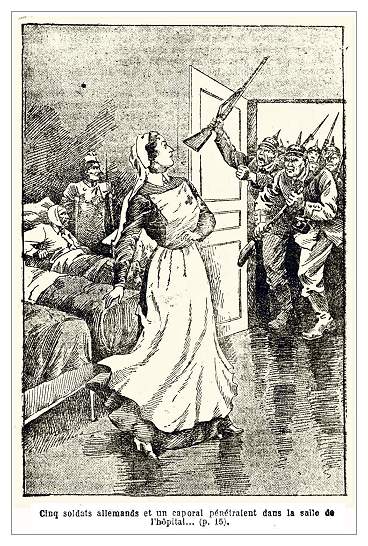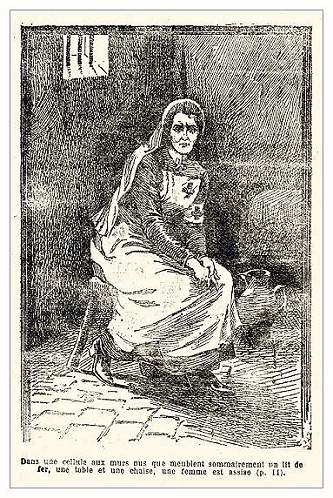

The Execution of a British Nurse

Cover Page


3 illustrations from a French penny novelette : see 'La Collection Patrie'
_________________________________
extract from the book :
The Secret Corps
by Ferdinand Touhy - 1920
Such reports as those quoted above would only be two of dozens streaming in each week from brave and devoted Belgian patriots, working with the eye of the tyrant perpetually upon them. Due tribute has never been paid to Belgium for this, not the least valuable part she played in the war.
Nor is enough known of heroic individuals like the Prince and Princess of Oroy, whose chateau near Mons was only one of many rallying centres where fugitives from German barbarity were sheltered regardless of consequences. The Croys initiated the system which was ultimately to send the hapless Miss Cavell to her death. Right at the commencement of the war the Princess went to Brussels, disguised as a peasant woman, and saw Edith Cavell, an old friend. To her she outlined her plan: The chateau at Mons was to be the rallying centre for all Allied fugitives, both wounded and unwounded. The peasants would lead the fugitives there by night, and the signal would be sand thrown at a certain window. The Princess proposed to establish "forwarding agents" along the line of route to the Dutch frontier, whose duty it would be to give food and shelter to the fugitives as they arrived, attended by duly accredited guides. Would Miss Cavell act as one of three such forwarding agents in Brussels? The Englishwoman readily agreed. She had, she said, already been sheltering English fugitives of her own accord. Miss Cavell was to keep the men in Brussels till they could safely be got away to the frontier.
On being reminded that the Germans had threatened to shoot anyone caught harbouring Allied soldiers Miss Cavell replied: "We must take the risk. We are doing no harm, only helping our own people. A German woman would do the same."
Miss Cavell was then given further instructions: "Don't have anything to do with men arriving here who are not in the company of one or other of our guides. Our guides will simply give the day of the week as the code word. Here are their assumed names. There will only be six altogether, three working between Mons and Brussels, and three more between Brussels and the Dutch frontier. The latter are poachers and smugglers, well accustomed to slipping into Holland. They will all be under ' Bourg.'
After the system had been working some time the Germans got much stricter, and only parties of two or three could be got through to Brussels, and these had to have false identification papers prepared. The Princess took the men's photographs, while the Prince forged the signatures and stamps.
Miss Cavell used herself to take the men to the rendezvous in Brussels whence they were to try and reach the frontier. She warded off suspicion by sending her fugitives out into the crowded streets by day if they were French or Belgian, and by giving them work as orderlies in her hospital if they should be English, and so, tongue-tied. So that whenever the Germans called they found everything in order. Many fugitives, unfortunately, were caught, and when in civilian clothes, or even if still in uniform, were shot out of hand.
All through the spring and summer of 1915, the process of smuggling the fugitives into Holland continued. Miss Cavell went on with her own work all the time, nursing Germans, French, and Belgians. She never made a slip from beginning to end. She was ultimately given away by one or two of the men she had smuggled out of the country writing to thank her. The Germans intercepted these letters. This was just before the battle of Loos, and the Germans at once "saw red." They themselves, as I have said, had managed to introduce a number of spies into England in the guise of Belgian refugees. Surely Miss Cavell was passing spies across the Dutch frontier in addition to fugitive soldiers! In their clumsy way they thought to entrap the Englishwoman by sending to her house two agents who posed as fugitives from the Mons chateau. Miss Cavell, not seeing a recognised guide, simply answered that she could not take them in-nothing more. The Germans had hoped in this way to get in touch with the other links in the chain as Miss Cavell passed the bogus fugitives on, and so possibly get to the bottom of a general espionage conspiracy. They already held sufficient proof to arrest Miss Cavell on the lesser charge of harbouring fugitives- punishable by them, however, with the same penalty as the greater, espionage.
Events now moved rapidly. "Bourg" was the first to be arrested. Miss Cavell warned the Prince, and it was decided that he should disappear to clear the air. The Prince, however, would never have gone had he known of the wholesale arrests that were to follow. In effect, a week later the Germans arrested 30 persons, including the Princess and Miss Cavell. Few were allowed a lawyer. In order to extract information from the prisoners, none of whom would answer any questions, the Germans introduced agents masquerading as fellow-prisoners into the cells. These bogus prisoners, acting on definite instructions, succeeded in drawing out several of the real prisoners and making them talk, as evidence at the "trial" afterwards showed.
"Bourg" on being sentenced to death, sent for his wife and told her he had got 15 years in a fortress, discussed plans with her, made arrangements regarding her future and that of his children, said good-bye and then wrote a letter to be delivered after his death. He refused to be blindfolded saying he would let no German touch him and that he would not be blindfolded to be shot by swine.